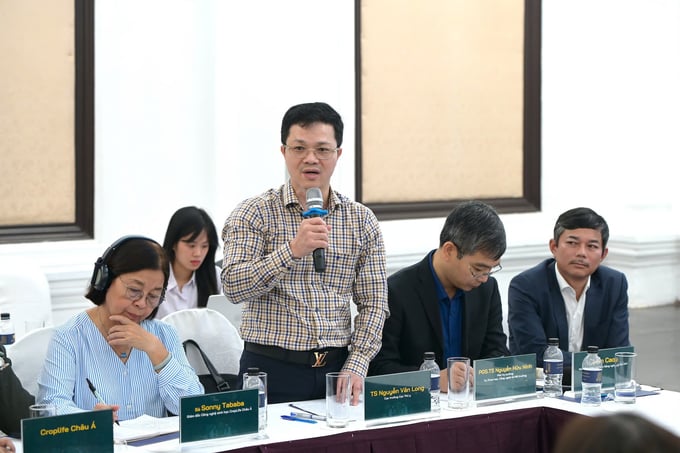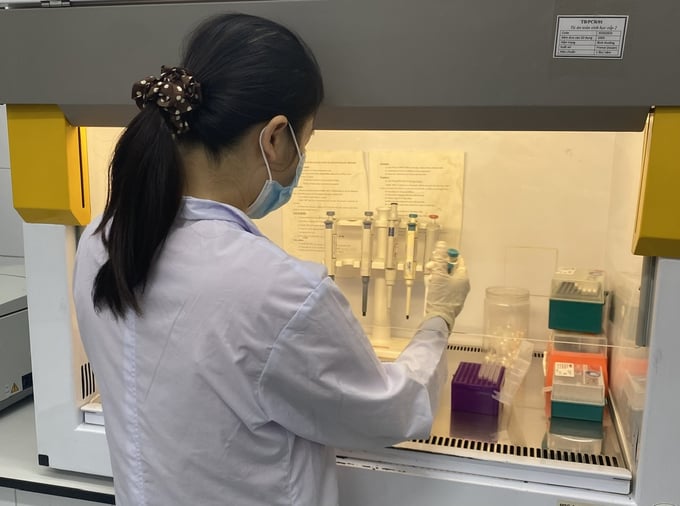November 26, 2025 | 15:38 GMT +7
November 26, 2025 | 15:38 GMT +7
Hotline: 0913.378.918
November 26, 2025 | 15:38 GMT +7
Hotline: 0913.378.918

Dr. Nguyen Van Long, Director of the Department of Animal Health, shared the role and contributions of biotechnology to the Vietnamese veterinary industry. Photo: HT.
During the forum “Achievements and directions for the application of biotechnology in sustainable agricultural development in the context of international integration", Director of the Department of Animal Health, Nguyen Van Long, emphasized: “Vietnam can take pride in producing many vaccines for disease prevention in livestock, including the most complex vaccines, particularly those for avian influenza and African swine fever, thanks to mastering science and technology”.
Dr. Nguyen Van Long also shared that the rate of avian influenza vaccine produced in Vietnam accounts for over 60% of the domestic market share, thanks to its effectiveness and the ability to adapt to new vaccine strains. These products not only help protect livestock health but also aid in preventing antibiotic resistance, a pressing issue of global concern.
In addition to vaccine development, biotechnology is also being applied extensively in other areas of the veterinary industry, including diagnostic testing, antibiotic control, and disease management. This is particularly important as Vietnam is one of the 15 largest markets for animal products globally and continuously faces new pathogens from abroad. Each year, at least one new strain of pathogen enters Vietnam, requiring the veterinary system to constantly update and enhance its diagnostic and disease prevention methods.
According to Mr. Long, animal diseases can be divided into two main categories: those that only affect livestock and those that can be transmitted to humans. Notably, Vietnam has recently reported several complex virus strains, such as the H5 avian influenza virus affecting tigers in Dong Nai and Long An, as well as diseases in dairy cows in Lam Dong.
Moreover, one of the biggest challenges facing the Vietnamese veterinary industry is the uncontrolled use of antibiotics in animal feed. Mr. Long emphasized that the abuse of antibiotics not only poses a risk of drug resistance but also creates serious issues for public health and livestock. Therefore, the Department of Animal Health is promoting the replacement of antibiotics with biological products and vaccines in farming to ensure biosecurity in livestock production.

The Animal Disease Diagnosis and Testing Station under the Regional Veterinary Department II (Department of Animal Health) in Hai Phong City. Photo: Hoai Tho.
In particular, in addressing emerging diseases, the Vietnamese veterinary industry cannot do without international cooperation. The continuous reception of advanced technologies and biological products from developed countries has helped Vietnam enhance its capacity for disease management and prevention.
However, the veterinary sector still faces some difficulties related to mechanisms and policies. One major issue is the slow approval process for technology projects, which leads to scientific research not being applied in practice in a timely manner.
“Submitting a technology project under state mechanisms takes a lot of time, which can cause Vietnam's basic research to stagnate”, stated the leadership of the Department of Animal Health, suggesting the need for a more open model between regulatory agencies, scientists, and businesses to bring research into practice more quickly.
In addition, the procurement bidding mechanism is currently a significant barrier for research institutes and veterinary units. The complex and costly processes in terms of both money and time make it difficult to access materials and equipment, directly affecting the progress of research and the production of biological products.
Thus, the application of biotechnology is not only a trend but also a crucial factor that helps the Vietnamese veterinary industry enhance its capacity for disease management, protect livestock health, and ensure safety for consumers.
“If there is no change in management and policy, the Vietnamese veterinary industry will struggle to compete and keep up with scientific and technological advancements worldwide”, affirmed the leadership of the Department of Animal Health.
Translated by Phuong Linh

(VAN) Thanh Hoa province has substantial potential to supply carbon credits, opening opportunities for green economic development, enhancing agriculture and forestry value.
/2025/11/25/1741-0-nongnghiep-221736.jpg)
(VAN) The application of AI helps identify emission sources and assess air pollution developments, thereby supporting management agencies in issuing timely and appropriate control policies.

(VAN) Viet Nam will develop its carbon market not only by prioritizing transaction volumes but also by transitioning to a low-emission economy.
/2025/11/25/3413-1-171953_261.jpg)
(VAN) Experts from the Vietnam Academy of Science and Technology have conducted surveys to identify the causes of landslides in Lam Dong province and propose natural disaster prevention solutions.

(VAN) The HNT reservoir operation support system, developed by WeatherPlus in collaboration with Kyushu Electric Power, enables real-time rainfall forecasting, inflow forecasting, and flood-release simulations.

(VAN) Dr. Cao Duc Phat stated that the localization of early natural disaster warning technologies will help meet practical requirements and create favorable conditions for domestic research institutions and businesses to develop.

(VAN) In addition to improving early-warning technologies, there is a need for software that can guide response actions, track community evacuations, and manage safe zones through digital mapping.